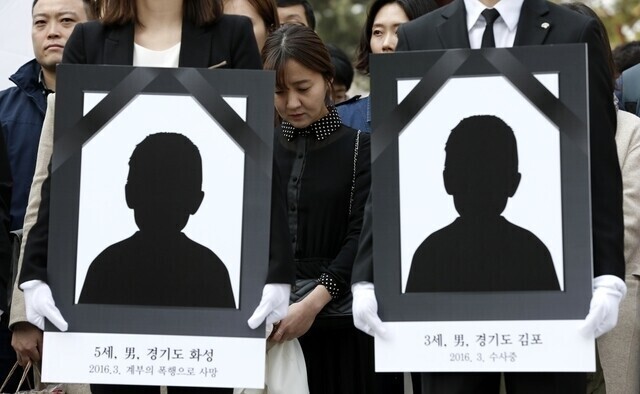hankyoreh
Links to other country sites 다른 나라 사이트 링크
S. Korea moving to make ban corporal punishment of children

On June 10, South Korea’s Ministry of Justice (MOJ) started working to revise the civil code to prevent parents from using corporal punishment on their children. The move came after prosecutors were given custody of a 40-year-old woman who forced the son of her live-in boyfriend into a suitcase and left him there for seven hours, causing his heart to stop. The Justice Ministry’s announcement ends a long period of hesitation on the issue and raises the possibility that the related section of the civil code, which dates back to 1958, will at last be revised.
The MOJ announced on Wednesday that it plans to revise the civil code by eliminating a section that gives parents the right to punish their children and by making the ban on corporal punishment explicit. In doing so, the MOJ accepts a recommendation by the Legal Reform Committee for an Inclusive Family Culture, which reports to the MOJ, to eliminate the section of the civil code about the right to punish children and replace it with a section about parental discipline.
Article 915 of the current civil code allows parents to punish a child as necessary for their protection or education and to send a child to a reform school or a correctional institution, given the permission of the court.
While this passage refers to the degree of punishment permitted under social norms in the course of parental discipline, it has been wrongly understood as allowing parents to use corporal punishment. It has been observed that the parental right to punish children clashes with the Child Welfare Act, but that right has been maintained anyway because of the belief in society that corporal punishment is an essential part of parental discipline.
The MOJ will be soliciting the opinion of adolescents and children’s rights experts during a meeting with related organizations, including Save the Children, on June 12. After that, it will be consulting with professors, lawyers, and other experts to draft the exact language of the revision. The MOJ hopes to submit the revised civil code to the National Assembly as soon as possible, after completing the required procedures, which include providing public notice of the revision.
Before this revision can go ahead, experts think there needs to be a shift in public attitudes. “It won’t be easy to convince the public that there’s a difference between punishment and discipline,” said Chung, Ick-joong, a professor of social welfare at Ewha Womans University.
“It’s very significant that the Ministry of Justice, as the relevant ministry, intends to revise the law that has been a stumbling block for efforts to prevent child abuse. But since a considerable portion of the public regard corporal punishment as an issue of parental rights, we’re planning to organize a campaign to show that disciplining children through corporal punishment leads to the crime of child abuse,” said an official at the Ministry of Health and Welfare.
In a 2017 survey, 76% of South Koreans said that corporal punishment is necessary for children’s education.
Given the recent spate of serious incidents of child abuse, South Korea’s National Police Agency (NPA) will be focusing its efforts on stopping child abuse over the next month, from June 10 to July 9. As part of that campaign, it will be setting up a task force with the Ministry of Health and Welfare, the Ministry of Education, and local governments to identify and protect children at risk.
By Kwon Ji-dam and Kim Jeong-pil, staff reporters
Please direct comments or questions to [english@hani.co.kr]

Editorial・opinion
![[Column] Life on our Trisolaris [Column] Life on our Trisolaris](https://flexible.img.hani.co.kr/flexible/normal/500/300/imgdb/original/2024/0505/4817148682278544.jpg) [Column] Life on our Trisolaris
[Column] Life on our Trisolaris![[Editorial] Penalties for airing allegations against Korea’s first lady endanger free press [Editorial] Penalties for airing allegations against Korea’s first lady endanger free press](https://flexible.img.hani.co.kr/flexible/normal/500/300/imgdb/original/2024/0502/1817146398095106.jpg) [Editorial] Penalties for airing allegations against Korea’s first lady endanger free press
[Editorial] Penalties for airing allegations against Korea’s first lady endanger free press- [Editorial] Yoon must halt procurement of SM-3 interceptor missiles
- [Guest essay] Maybe Korea’s rapid population decline is an opportunity, not a crisis
- [Column] Can Yoon steer diplomacy with Russia, China back on track?
- [Column] Season 2 of special prosecutor probe may be coming to Korea soon
- [Column] Park Geun-hye déjà vu in Yoon Suk-yeol
- [Editorial] New weight of N. Korea’s nuclear threats makes dialogue all the more urgent
- [Guest essay] The real reason Korea’s new right wants to dub Rhee a founding father
- [Column] ‘Choson’: Is it time we start referring to N. Korea in its own terms?
Most viewed articles
- 160% of young Koreans see no need to have kids after marriage
- 2[Column] Life on our Trisolaris
- 3[Reporter’s notebook] In Min’s world, she’s the artist — and NewJeans is her art
- 4Hybe-Ador dispute shines light on pervasive issues behind K-pop’s tidy facade
- 5[Editorial] Penalties for airing allegations against Korea’s first lady endanger free press
- 6Presidential office warns of veto in response to opposition passing special counsel probe act
- 7Vietnamese war victims speak of sexual violence by S. Korean troops for the first time
- 8S. Korea discusses participation in defense development with AUKUS alliance
- 9Japan says it’s not pressuring Naver to sell Line, but Korean insiders say otherwise
- 10Months and months of overdue wages are pushing migrant workers in Korea into debt